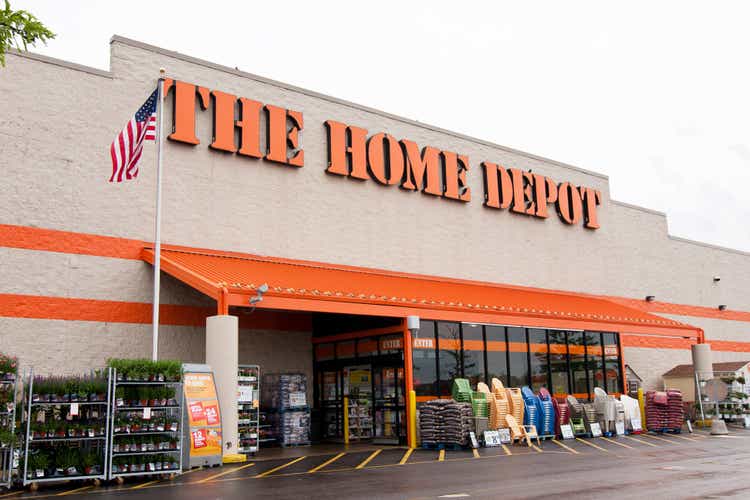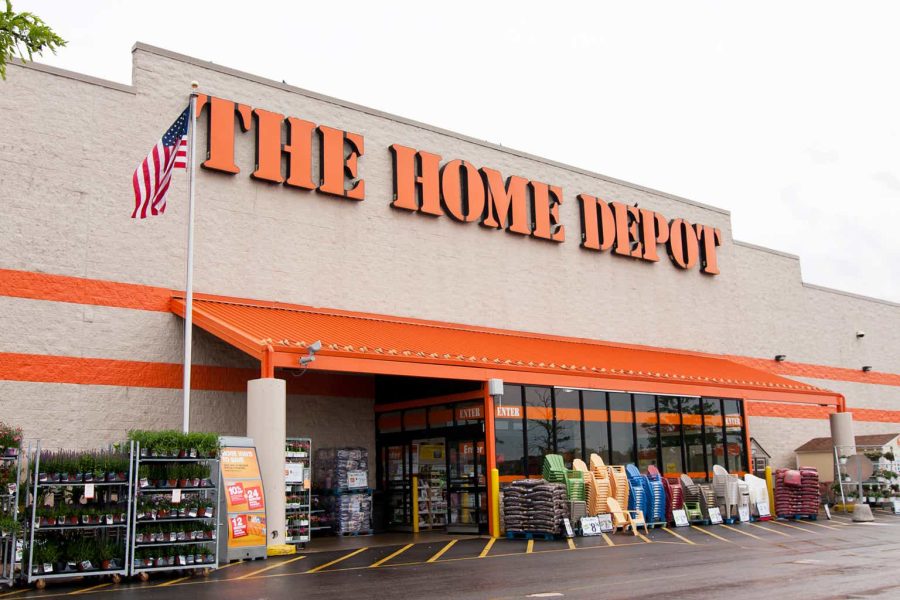Summary:
- Home Depot has managed stagnating sales and earnings well compared to peers and pandemic beneficiaries.
- The acquisition of SRS Distribution brings growth potential, but the re-rating of shares is largely complete.
- Despite stable financials, a cautious approach is advised amidst stagnant earnings and increased leverage.
patty_c
It has been quite a while since I last covered shares of Home Depot (NYSE:HD) (NEOE:HD:CA); in fact, it was the fall of 2022 when I concluded that there were no quick fixes. The company was about to see the pain of a slower housing market, which did arrive, but arrived in the form of stagnating sales and earnings for a while.
Home Depot has managed this situation much better than many peers and pandemic-related beneficiaries.
With again no real growth seen yet in 2024, Home Depot has acquired SRS this spring to bring some imagination in the shares, as frankly the re-rating has been largely completed. Hence, I am happy to hold a core long-term position, but I see no need to actively consider chasing shares here.
Home Depot – Premium Home Improvement
Home Depot hardly requires an introduction, and pre-pandemic Home Depot was a $110 billion business which posted operating earnings of $15 billion, translating into lucrative operating margins for a home improvement retailer. The company posted net earnings of $11 billion, equal to about $10 per share.
These shares were trading in the low $200s, valuing the business at about 22-23 times earnings, a well-deserved but relatively modest premium to the market at large. A $28 billion net debt load was substantial, but very manageable given the underlying profitability of the business.
The pandemic unleashed animal spirits as the company grew sales 20% to $132 billion, with home improvement jobs and construction booming. The company announced an $8 billion deal for HD Supply in the meantime. 2021 revenues rose another 14% to $151 billion with earnings posted in excess of $15 per share. Truth be told, while net debt ticked up to $38 billion, that was only working down to a 1.5 times leverage ratio based on EBITDA of around $25 billion.
Shares were trading around the $275 mark in the fall of 2022 as the company was setting up for very modest sales and earnings growth in 2022, but the composition of growth was not so strong. Inflationary trends pushed up pricing, and while sales grew in a modest fashion, volumes were actually down.
With earnings power around $16 per share, earnings multiples looked quite reasonable at 17 times earnings. However, macro conditions were causing a real overhang as rising interest rates were set to impact the housing market, already visible with volume trends being negative.
However, there was a small silver lining. Higher energy prices might drive the need and demand for insulation a well, as the $275 level seemed like a solid entry point for a quality company, even as earnings power still came in above-average here.
A Modest Recovery
Since the near two-year period since I last covered shares, Home Depot has largely traded around the $300 mark in 2023. Shares have risen to $390 in March of this year, now having sold off to $363 per share. This translated into a decent 32% gain in less than two years’ time, excluding dividends received in the meantime, which are paid out at a 2.5% yield.
This came as the business has largely stabilized, and frankly, that was good enough for investors. Revenues for 2022 came in at $157 billion, some six billion ahead of 2021, with earnings reported at $16 and change, up a dollar as well.
Revenues fell to $153 billion in 2023, down 3% on the year before, in still an inflationary environment. This was seen on the bottom line, with operating profits down 10% to just below $22 billion, and net earnings down 11% to $15 billion. Amidst limited buybacks, which reduced the share count to a billion shares, earnings came in just ahead of the $15 per share mark.
The company guided for a 1% increase in 2024 sales, which looks better than it is, as 53 weeks in the fiscal year will add just over $2 billion in total sales, indicating that organic growth otherwise would be down slightly. The company guided for a similar 1% increase in earnings per share as well, which was not too exciting.
The company remains upbeat on its business and future, however, as the dividend has been hiked by 7.7% to $9.00 per share, indicating a payout ratio of about 60%, as much of the growth has to come from existing stores. Net debt was pretty stable around the $40 billion mark, with EBITDA reported just shy of $25 billion here.
At $390, the company traded around 25 times earnings here all while earnings power has been flattish for a couple of years in a row, as the share price advancement has been driven by a valuation re-rating instead of improved earnings. Judging by the price action, investors have arguably hoped for an outperformance compared to the outlook here.
More Deals
In March, Home Depot announced its intention to acquire SRS Distribution, a leading specialty retail trade distribution company, active in roofing, landscaping and pools. Moving into these adjacent retail markets, Home Depot aims to grow its addressable market by $50 billion, targeting a total market opportunity worth a trillion per year. In that sense, it is really a strategic acquisition, aimed to bring the best customer experience with a wide range of related markets.
The deal comes at a price, as Home Depot is willing to spend $18.25 billion to acquire the company, which operates 760 branches, pretty much across the nation. With a $10 billion sales contribution and $1.1 billion in EBITDA generated, the deal is valued at 1.8 times sales and at just over 16 times EBITDA.
In comparison, Home Depot was valued around $390 billion, with the billion shares trading at $390 around the peak in March. Including net debt of $40 billion, the enterprise valuation jumped to $430 billion, valuing Home Depot at nearly 3 times sales, and about 17 times EBITDA. This meant that EBITDA multiples are similar, for the simple reason that Home Depot’s margin of 16% of sales surpass margins of SRS by about 5%.
Pro forma net debt will jump to $58 billion assuming a cash/debt financing, with pro forma EBITDA seen at $26 billion, resulting in a leverage ratio in the low 2s, with pro forma sales up nearly 7% here. GAAP earnings will see some dilution from amortization charges, but on a cash basis earnings will move higher, and that excluding the potential for synergies.
Shares of Home Depot actually fell $15, close to 4%, in response to the announcement, wiping out $15 billion in value. This was a clear testament that investors were not entirely believing the diversification story here.
Stagnating All Along
In May, the company posted a 2% fall in first quarter sales as the company maintained the guidance. That was ahead of the SRS deal which had not yet closed of course, as that deal closed in June.
With shares having stabilized at current levels of $363 per share amidst hopes for lower interest rates spurring construction and remodeling activity, I am leaning a bit cautious here. Earnings power likely hoovers around $15-16 per share this year, and might see growth next year if interest rate declines come through and SRS contributes in full.
Even in such a case, earnings would have to grow to $18 per share to reduce current multiples towards 20 times, all while the company has taken on a bit more leverage than it has traditionally operated with.
This seems rich enough, and while I initiated a small position in 2022 with a long-term horizon, I see no great need to add to this position here, nor sell out of a modest long position here.
Analyst’s Disclosure: I/we have no stock, option or similar derivative position in any of the companies mentioned, and no plans to initiate any such positions within the next 72 hours. I wrote this article myself, and it expresses my own opinions. I am not receiving compensation for it (other than from Seeking Alpha). I have no business relationship with any company whose stock is mentioned in this article.
Seeking Alpha’s Disclosure: Past performance is no guarantee of future results. No recommendation or advice is being given as to whether any investment is suitable for a particular investor. Any views or opinions expressed above may not reflect those of Seeking Alpha as a whole. Seeking Alpha is not a licensed securities dealer, broker or US investment adviser or investment bank. Our analysts are third party authors that include both professional investors and individual investors who may not be licensed or certified by any institute or regulatory body.
If you like to see more ideas, please subscribe to the premium service “Value in Corporate Events” here and try the free trial. In this service we cover major earnings events, M&A, IPOs and other significant corporate events with actionable ideas. Furthermore, we provide coverage of situations and names on request!
